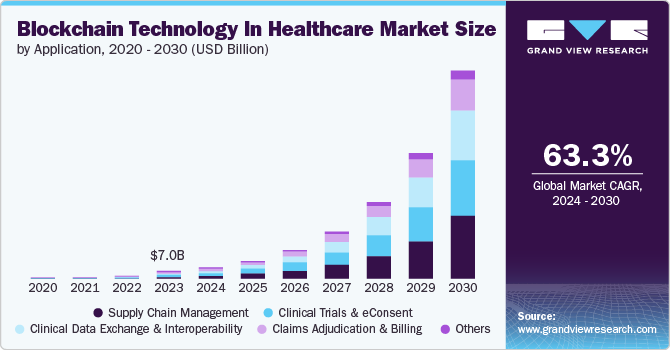In the fast-paced world of healthcare, AI-enhanced data privacy in blockchain healthcare apps has emerged as a critical solution for safeguarding sensitive patient information. By integrating artificial intelligence (AI) with blockchain technology, healthcare organizations can establish a secure framework that protects patient data and enhances operational efficiency. As the healthcare industry digitizes, the need for robust data management systems prioritizing security and privacy is becoming increasingly important.
This article explores how AI-enhanced data privacy and blockchain technology work together to protect patient information in healthcare apps. By combining AI’s capabilities in anomaly detection with blockchain’s secure, decentralized architecture, healthcare providers can significantly improve data security and integrity.
What is AI-Enhanced Data Privacy?
AI-enhanced data privacy refers to using AI technologies to strengthen the protection of sensitive information. In healthcare, AI algorithms detect potential security threats, anonymize patient data, and ensure compliance with privacy standards. By combining AI with existing security protocols, healthcare providers can proactively defend against unauthorized access and data breaches, safeguarding patient privacy.
Importance of Data Privacy in Healthcare
Protecting patient data is of utmost importance in healthcare due to the sensitive nature of the information involved. Medical records include personal identification details, medical histories, and financial information that require protection from unauthorized access. Breaches can lead to identity theft, financial fraud, and even harm patient safety. Maintaining data privacy is a legal obligation and a fundamental ethical responsibility to preserve patient trust and confidence.Blockchain technology, known for its decentralized, secure, and transparent properties, holds transformative potential for healthcare data management. Its distinct characteristics make it an excellent fit for addressing some of the most pressing challenges in the healthcare sector, from data integrity to supply chain transparency.
Overview of Blockchain Technology in Healthcare
Blockchain technology, widely known for its association with cryptocurrencies, is a decentralized ledger that securely records and verifies transactions across multiple nodes in a network. In healthcare, blockchain can be leveraged to store patient records, manage consent, and facilitate secure data sharing among medical professionals. The technology’s inherent characteristics—transparency, immutability, and decentralization—make it a valuable tool for ensuring data integrity and security in healthcare settings.
Critical Applications of Blockchain in Healthcare
Electronic Health Records (EHRs)
-
- Ensuring Data Integrity: Blockchain’s immutable ledger can safeguard EHRs from unauthorized modifications, guaranteeing the authenticity and reliability of patient records.
- Promoting Interoperability: A decentralized blockchain network can facilitate seamless data exchange between healthcare providers, eliminating the need for centralized databases and reducing data silos.
- Empowering Patient Control: With blockchain, patients can gain greater control over their health data, managing permissions to share information with healthcare providers, researchers, or insurers as needed.
Supply Chain Management
-
- Tracking and Verification: Blockchain enables end-to-end traceability of medical supplies, pharmaceuticals, and devices, helping to ensure that only authentic and safe products reach patients.
- Combating Counterfeits: By recording every step of the supply chain on an immutable ledger, blockchain can help detect and prevent the introduction of counterfeit or substandard medical products.
Clinical Trials
-
- Maintaining Data Integrity: Blockchain ensures that clinical trial data is securely recorded and resistant to tampering, essential for reliable research outcomes and regulatory compliance.
- Streamlining Patient Consent: Blockchain-based systems can facilitate transparent and auditable patient consent processes, enhancing trust and accountability in clinical research.
Healthcare Payments
-
- Increasing Transparency: Blockchain can provide a clear, traceable record of healthcare transactions, reducing the risk of billing fraud and ensuring that payments are accurately processed.
- Enhancing Efficiency: Smart contracts on blockchain can automate payment workflows, minimizing administrative overhead and speeding up payment settlements.
Healthcare Insurance
-
- Streamlining Claims Processing: Blockchain can simplify the insurance claims process, reducing the time and effort required for patients to receive reimbursements.
- Preventing Fraud: By offering a transparent and tamper-proof record of claims, blockchain can help detect fraudulent activities and reduce overall insurance costs.
The Role of AI in Healthcare Data Privacy
Given its potential impact, healthcare data is among the most sensitive and precious forms of information. Mishandling or unauthorized access to this data can lead to severe consequences, including identity theft, financial fraud, and even physical harm. With the exponential growth of healthcare data, ensuring robust privacy measures has become increasingly crucial. Artificial Intelligence (AI) offers significant potential in safeguarding this data but also introduces unique risks and challenges.
Advantages of AI in Safeguarding Healthcare Data Privacy
Advanced Threat Detection
AI systems can scan extensive datasets in real-time to detect unusual patterns and anomalies that may signal unauthorized access or data breaches. This rapid response capability enhances the security of healthcare data.
Proactive Risk Management
AI can forecast potential vulnerabilities and security risks by analyzing historical data and identifying trends. This enables healthcare organizations to implement preventive measures before incidents occur.
Data Masking and Anonymization
AI automatically masks or anonymizes sensitive patient information, ensuring that unauthorized individuals who access the data find it incomprehensible and unusable.
Streamlined Compliance
AI can automate adherence to stringent healthcare data privacy regulations such as HIPAA, minimizing the likelihood of human error and ensuring continuous compliance with legal and regulatory standards.
AI-Driven Anomaly Detection
Anomaly detection using AI involves identifying irregularities in data access patterns that may indicate security threats. In the healthcare context, this could mean monitoring attempts to access patient records, ensuring that only authorized individuals can view or modify sensitive data. AI systems learn from historical data to establish what constitutes normal behavior and flag activities that deviate from these norms. For example, accessing patient information from an unusual location or at an extraordinary time would trigger an alert, prompting further investigation.
Predictive Analytics and Data Protection
AI-driven predictive analytics helps healthcare providers identify and mitigate security risks before they become critical issues. By analyzing data access and usage patterns, AI can detect weak points in the security infrastructure and suggest areas for improvement. This invaluable foresight allows healthcare providers to fortify their defenses and reduce the likelihood of successful cyberattacks.
Case Studies of AI-Enhanced Blockchain Healthcare Applications
Integrating Artificial Intelligence (AI) and blockchain technology revolutionizes healthcare by creating secure, transparent, and efficient solutions. Below are case studies showcasing successful AI-enhanced blockchain applications in the healthcare sector:
MedChain
- Objective: MedChain provides a secure platform for managing and sharing electronic health records (EHRs).
- Operational Approach: Patients can store their health records on a blockchain, allowing them to control access to their data. AI algorithms analyze these records to offer insights into patient care, such as personalized treatment recommendations and predictive health analytics.
- Key Advantages: Enhanced security of patient data, streamlined sharing of health information across different healthcare providers, and improved patient care through AI-driven insights.
MediLedger
- Objective: MediLedger ensures traceability and compliance in the pharmaceutical supply chain.
- How It Works: The platform utilizes blockchain to track the lifecycle of pharmaceuticals from manufacturing to final distribution. AI analyzes data for signs of fraud, inconsistencies, or counterfeit drugs.
- Key Benefits: Greater transparency throughout the pharmaceutical supply chain, enhanced compliance with industry regulations, and reduced incidence of counterfeit products.
DocuChain
- Objective: DocuChain provides a secure and tamper-proof solution for storing and managing medical documents.
- How It Works: Documents are stored on a blockchain network, ensuring their authenticity and protection against unauthorized changes. AI algorithms analyze these documents, extracting insights and identifying patterns relevant to patient care.
- Key Benefits: Improved security for sensitive medical documentation, streamlined management of medical records, and reduced risk of document-related fraud.
Codearies: Data Privacy with AI-Enhanced Blockchain Solutions
At Codearies, we specialize in developing AI-enhanced data privacy solutions for blockchain applications, particularly in the healthcare sector. Our expertise integrates cutting-edge AI technologies with robust blockchain frameworks to create secure and efficient data management systems. We ensure comprehensive protection of sensitive patient information by employing AI for real-time monitoring and advanced anomaly detection alongside blockchain’s immutable data records. Our solutions are designed to improve data security, streamline consent management, and facilitate secure data sharing, helping healthcare organizations meet stringent privacy regulations while optimizing operational efficiency. Partner with Codearies to elevate your blockchain-based healthcare solutions with state-of-the-art AI-driven privacy features.Consult us now!
Future Outlook
The future of AI-enhanced data privacy in blockchain healthcare apps looks promising. As technology advances, healthcare organizations will increasingly adopt AI and blockchain solutions. These technologies will protect patient data, improve operational efficiency, and enhance patient trust. Ongoing research and development will lead to more sophisticated and scalable solutions. This progress will further solidify the role of AI and blockchain in the healthcare industry.
Conclusion
AI-enhanced data privacy in blockchain healthcare apps represents a significant step forward in protecting patient information. By leveraging the strengths of AI and blockchain, healthcare providers can ensure that patient data is secure, private, and accessible only to authorized individuals. These technologies will become very important in protecting patient privacy and raising the standard of healthcare services as they develop.
FAQS
Which blockchain is used in healthcare?
Healthcare utilizes various blockchains depending on the application. Ethereum is famous for its innovative contract capabilities, enabling secure data sharing and patient consent management. Hyperledger Fabricis favored for its permissioned blockchain framework, which is ideal for consortium-based networks. Additionally, MedRecis explicitly designed to manage electronic health records (EHRs), providing a tailored solution for patient data management.
Which algorithm is used in blockchain healthcare?
In blockchain healthcare, several algorithms are used to secure and validate transactions. Proof of Work (PoW), used in public blockchains like Ethereum, requires computational effort to validate transactions. Proof of Stake (PoS) is an alternative that offers energy efficiency. For permissioned blockchains, such as Hyperledger Fabric, consensus algorithms like Practical Byzantine Fault Tolerance are employed to ensure transaction integrity within a consortium.
What is blockchain for health data, and what is its potential use in health IT and healthcare-related research?
Blockchain for health data is a decentralized ledger technology that offers secure, transparent, and immutable records. Its potential includes enabling secure data sharing across healthcare providers, ensuring data integrity by preventing tampering, and facilitating research by allowing secure sharing of de-identified data while preserving patient privacy.
What is an example of AI and privacy?
An example of AI enhancing privacy is AI-powered data anonymization. AI algorithms automatically anonymize personal data by removing or obfuscating identifiable information before analysts or researchers use it. This process protects individuals’ privacy while enabling valuable data insights.
How is AI working in healthcare?
AI is revolutionizing healthcare through various applications. It assists diagnostics by analyzing medical images and data, supports personalized medicine by customizing treatment plans, uses predictive analytics to foresee health risks and outcomes, and improves operational efficiency by streamlining administrative tasks like scheduling and claims processing.






